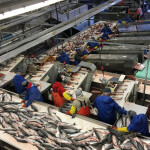Known for its tongue-in-cheek approach to marketing and advertising, Legal Sea Foods is featuring “blacklisted” seafood as part of an event intended to educate consumers about sustainable fisheries and to dispel misinformation about species commonly pegged as unsustainable. Co-hosted by the New England Culinary Guild, the four-course dinner on 24 January includes fritters with black tiger shrimp, prosciutto-wrapped hake and cod cheeks.
It’s a bold move that’s sure to be written off by the environmental community as a misguided publicity stunt. (Food writer Jacqueline Church essentially called the event a bunch of BS in her blog.)
The event may be a publicity stunt. But misguided it is not. If the event is, in fact, misguided, then it’s no more misguided than Whole Foods Market’s new seafood ratings system. As part of the system, which is based on science from the Monterey Bay Aquarium’s Seafood Watch program and the Blue Ocean Institute, the retailer sells species such as Hawaiian bigeye tuna that it advises consumers not to buy because they’re unsustainable.
Like Whole Foods, Legal Sea Foods is also trying to do something about consumers’ woeful lack of knowledge about seafood. But it’s backing its own information on sustainable fisheries and promoting species it says are unfairly labeled as unsustainable. The 60-year-old Boston-based company isn’t taking the easy route. The easier route would be failing to do its own homework and simply abiding by the Seafood Watch program.
That’s not to say the Seafood Watch program isn’t reputable and comprehensive. A lot of sound science goes into the program’s seafood-buying recommendations, and it’s respected by a growing number of retailers, chefs and consumers and adored by food writers. But it’s not the end all to be all.
Sustainability isn’t so black and white; it’s a complex concept, with many shades of gray. Any environmentalist would agree.
Legal Sea Foods is committed to sustainability and the fishing business — from operating its own processing and quality-control facility on the Boston waterfront to fueling its delivery vehicles with recycled cooking oil — so to say its dinner is merely a publicity stunt is shortsighted.
It’s certainly humorous, and that’s to be expected from company that never takes itself too seriously in its marketing and advertising. But Legal Sea Foods’ sense of humor shouldn’t detract from its willingness to grab the bull by the horns and do something creative to educate consumers about sustainable fisheries.





